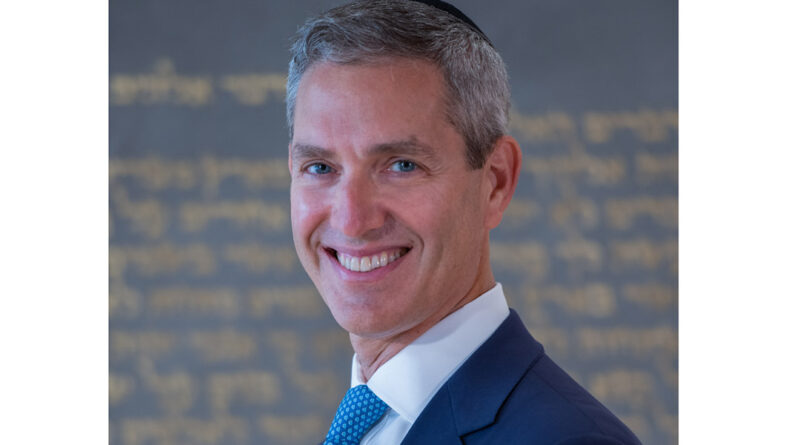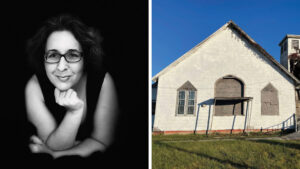The power and allure of nostalgia can be both a blessing and curse for Jews, Rabbi Dr. Elliot J. Cosgrove said Sunday morning, Nov. 6, at Chizuk Amuno Congregation’s kickoff of its 150th anniversary celebration.
“Nostalgia is often our favorite and most dangerous alibi,” said Rabbi Cosgrove, spiritual leader of New York’s Park Avenue Synagogue since 2008. “We have all sorts of alibis to excuse the present inertia. We do everything other than what we should be doing. We need to look at the landscape of Jewish life to assess the challenges and opportunities of our present moment and then develop the most creative, dynamic responses to the needs of our generation, and as leaders allocate our resources to making those changes happen.”
Speaking to more than 150 Chizuk Amuno congregants, Rabbi Cosgrove — considered one of the leading voices in Conservative Judaism today — said Jews frequently fail to outgrow the Jewish communal models and mindset of their youth.
“Our tastes get solidified at a certain point, and a hierarchy of preferences set in,” he said. “We’ll always consider our reference point to be a bit authoritative to those of another generation. Whatever comes after our stage of development is considered inferior to the references we hold sacred.”
The result, he said, is the profound generational chasm in contemporary Jewish life, with many younger Jews feeling alienated or apathetic about the community.
“The older generation is critical of the younger generation, saying they didn’t grow up in the wake of the Shoah, they didn’t experience the anxieties of ‘67 and ‘73 when Israel was being pushed into the sea, or the struggles of the Soviet Jewry movement, or Entebbe,” said Rabbi Cosgrove, 50, a Los Angeles native. “One generation wags its finger at another, blaming them for when they were born, saying, ‘They just don’t get it like we do.’”
In return, he said younger Jews tend to blame the previous generation “as an alibi of sorts for all that cannot be done today.”
Rabbi Cosgrove said dynamic and forward-thinking leadership is desperately required to help the Jewish community navigate its way through a new era. He offered the example of his congregation’s decision to invest in virtual religious services and programming at the outset of the pandemic, as well making conversion classes less rigorous.
“The mark of great leadership has never been framed by serving one’s grandparents’ Judaism,” he said. “Our leaders have always been led by the question of imagining, planning for and actualizing their grandchildren’s Judaism.”
An example of this type of innovative leadership was Rabbi Mordecai Kaplan, founder of Reconstructionist Judaism, who in the early 20th century realized Jewish life needed to be reconceptualized in America, said Rabbi Cosgrove.
“He saw that the old-world shtiebel [little synagogue] of the East European immigrants was not likely to satisfy the burgeoning Jewish community,” he said. “So on the Upper West Side he created the Jewish Center, which became the [model] for synagogues all around the country – this one included — a shul with a school and a pool. This was an innovation from the shtiebel of the old world. … Reconstructionist Judaism might be the smallest Jewish denomination, but Kaplan’s vision of Judaism as a civilization has shaped every denomination and every institution of American Jewish life.”
Rabbi Cosgrove also cited Chabad and Rabbi Menachem Mendel Schneerson, the late Lubavitcher rebbe, as role models for innovation.
“The rebbe set in motion a universe of shlichim, emissaries, a campaign that has spread far and wide on campuses, online, in the military — everywhere,” he said. “The rebbe’s vision for Jewish life has had a ripple effect well beyond Chabad – a non-judgmental, come-as-you-are view of Jewish leadership that is pre-modern in its sensibility but altogether modern in its approach.”
History shows that Jewish communal visionaries shared a common quality, Rabbi Cosgrove said.
“They didn’t wag their fingers or blame the next generation. They didn’t sit there with nostalgia for the old days,” he said. “They created a model of Jewish life and living that suited their generation and the generation to come. They asked the hard questions and worked to actualize their visions.
“They said hineni, here I am, to know where you came from, to know where you are, and to imagine an idealized future and having the courage to make it so.”
Pressed to Pivot
To reinvigorate Judaism in the 21st century, Rabbi Cosgrove said Jewish institutions must think beyond their bricks-and-mortar approach.
“We are living in an age of disintermediation,” he said. “All of our centralized communal umbrella institutions, Jewish and non-Jewish, are facing the challenges of disintermediation and how communities and institutional life take shape. Synagogues, federations, the ‘alphabet soup’ of the Jewish world are part of that transformation.
“Communities are different today,” Rabbi Cosgrove said. “Assumptions about membership, access to content, philanthropy are all undergoing a sea change, and a pipeline crisis has emerged. The Jewish community has failed to create a world that ensures the quantity and quality of rabbis, cantors, educators and Jewish communal professionals to serve the evolving needs of the next generation. We’re living through a new age, and legacy institutions must pivot to face the future.”
Like gender, race and sexuality matters in American life, the concept of Jewish identity is evolving, he said.
“We live in world of blended and hybrid and other identities, and a whole new age of what constitutes a Jewish community and Jewish identity,” Rabbi Cosgrove said. “The lines between us and them isn’t so clear anymore, especially when they are part of us. Young Jews will not remain Jewish because of the Holocaust, antisemitism or Israel but because there is something compelling, engaging and enriching to live a Jewish life. We are all Jews-by-choice, and every decision needs to be made with eyes wide open to this reality.”
In addition, Rabbi Cosgrove said the community must contemplate the changing nature of Jewish power and powerlessness. Jews are vulnerable yet privileged in American society, he said, while Israel is no longer the perennial underdog in the Middle East conflict. Meanwhile, partisan political issues — such as U.S. relations with Iran and affirmative action — create deeper wedges between Jews.
“The Jewish community is caught betwixt and between,” Rabbi Cosgrove said “This mixture of forces, revolving around Jewish power and powerlessness, sit at the base of our arguments about Israel and who we are as a community. Can we be committed to universalism and particularism, literalism and self-preservation all at the same time?”
He recommended more avenues for honest and respectful dialogue within the community.
“We need a stage … where we can listen to each other and disagree without being disagreeable,” he said. “My concern is that these [internal communal} arguments have become a means of avoiding what we should be talking about. My fear is we’ve made these arguments compensatory acts for a paper-thin American Jewish identity. I wish we spent more time not thinking about uranium enrichment [in Iran] but the enrichment of Jewish identity and education.”
Thinking Like Prophets
Despite the formidable challenges, Rabbi Cosgrove said he believes there are major opportunities to revitalize American Jewry.
“If we want strong schools, shuls and federations, if we want a strong and substantive relationship with Israel, if we really want Jewish identity in all its variations to take hold, then we have to say hineni with eyes wide open, grateful to the past, encouraging of the present, willing for the needs of the community to be placed ahead of our own personal fiefdoms,” he said. “Good ideas abound, [and] there are new approaches to be imagined. We need to think big, we need to think like prophets, we need to enter the arena and dare to fail, and — no different than the generations before us — step up to the calling of the hour.”
During a question-and-answer session moderated by Chizuk Amuno’s Rabbi Joshua Z. Gruenberg, Rabbi Cosgrove said he believes the Conservative movement can play a substantive role in the transformation of American Jewry.
“We have become immigrants to the Jewish tradition,” he said. “The Conservative movement is positioned to be the movement to retrieve the lost souls of American Jewry. There are Jews with degrees from major universities who can’t say kiddish or are embarrassed to be called up to the Torah. There is a lane for Conservative Judaism, and we need to take it. The problem at large congregations is people think being Jewish is something you do only when the rabbi and cantor are in the room. I want Judaism to be something people do when God is in the room.”
In response to an audience member’s question, Rabbi Cosgrove said he feels the community needs to discard labels as much as possible.
“Labels, to me, signal a lack of substance,” he said. “A young person doesn’t have a compelling reason to hold their Judaism with pride if they don’t know in their kishkes what Judaism means for themselves. We need to create substantive Jewish identities.”
For information about Chizuk Amuno’s 150th anniversary campaign, visit chizukamuno.org/150.





